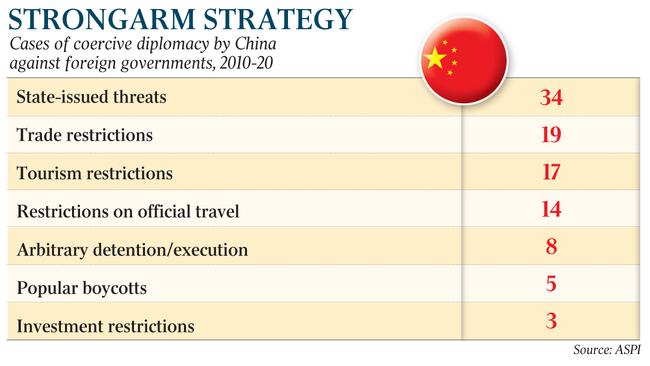Beijing’s ‘bully diplomacy’ mushrooming
The Chinese Communist Party is escalating its use of ‘coercive diplomacy’ to bend nations and multinational firms to its will.

The Chinese Communist Party is escalating its use of “coercive diplomacy” to bend nation states and multinational companies to its will, a new study has found.
The Australian Strategic Policy Institute has identified 152 instances of non-military coercion by the CCP over the past decade, including 17 directed at Australia.
State-issued threats are the most common form of coercion, followed by trade and tourism restrictions, restrictions on official travel and arbitrary detention or execution, according to the new ASPI report.
The paper, released a day after China launched a new anti-subsidy investigation into Australian wine, says the CCP employs a unique form of coercive diplomacy that does not officially acknowledge links between the measures taken and the party’s interests.
This gives China “greater flexibility in escalating or de-escalating situations with less accountability and international oversight”, ASPI says.
“China is the largest trading partner for nearly two-thirds of the world’s countries, and its global economic importance gives it significant leverage,” it says.
“The economic, business and security risks of that dependency are likely to increase if the CCP can continue to successfully use this form of coercion.”
The number of recorded cases of CCP coercive diplomacy has increased since 2018, with 34 recorded cases so far this year.
The authors gathered as many examples of Chinese coercive diplomacy as possible over the past 10 years through open-source materials, subjecting the list to peer review by 27 experts from 16 countries.
Their report identifies the Morrison government’s call for an investigation into the origins and handling of the COVID-19 outbreak in April this year as the trigger for a series of coercive CCP actions against Australia.
They include a state-issued threat of economic retribution by Chinese ambassador Cheng Jingye, followed by trade restrictions on Australian barley and beef, an official travel warning and a death sentence for Australian drug trafficker Karm Gilespie, who was arrested in China seven years ago.

It counts 2019 restrictions on Australian coal exports, travel restrictions on Australian MPs, and threats of “unbearable consequences” conveyed through Chinese state media over Australia’s position on the South China Sea as examples of CCP coercion.
Coercive CCP diplomacy is most commonly deployed against targets in Europe, North America, Australia, New Zealand and East Asia, the report says. Developing countries are largely spared because they typically have strong links to the CCP.
The report points to internal encouragement of coercive diplomacy by Chinese academics, highlighting an international law expert at the Zhongnan University of Economics and Law, who urged China to “liberate its thinking, and fully utilise the important tool of unilateral sanctions”.
The study calls for a “co-ordinated and joint pushback through multilateral forums”, and through coalitions of states affected by the same coercive methods.




To join the conversation, please log in. Don't have an account? Register
Join the conversation, you are commenting as Logout